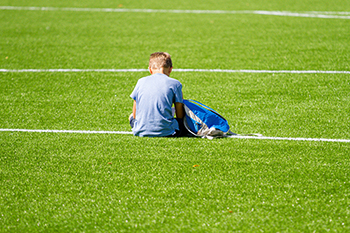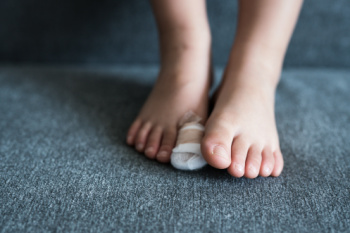Freehold (732) 294-9393
Freehold (732) 294-9393

Field hockey is a fast-paced sport played on turf or grass, where players use curved sticks to hit a ball toward the opposing team’s goal. Popular worldwide, the sport demands quick movements, sudden stops, and rapid direction changes, all of which put players at risk for ankle sprains. Ankle sprains happen when the foot twists awkwardly, overstretching or tearing ligaments. In field hockey, this can occur from cutting movements, uneven playing surfaces, or accidental contact with another player’s stick or foot. Other common foot and ankle injuries in this sport include fractures, tendonitis, and turf toe, often caused by wearing improper footwear, and the high-impact nature of the game. Wearing supportive shoes, strengthening the ankle muscles, and taping or bracing weak ankles can help prevent injuries. If you enjoy playing field hockey and have sustained a foot or ankle injury, it is suggested that you see a podiatrist for appropriate treatment.
Sports related foot and ankle injuries require proper treatment before players can go back to their regular routines. For more information, contact Dr. Henry Miller of New Jersey. Our doctor can provide the care you need to keep you pain-free and on your feet.
Sports Related Foot and Ankle Injuries
Foot and ankle injuries are a common occurrence when it comes to athletes of any sport. While many athletes dismiss the initial aches and pains, the truth is that ignoring potential foot and ankle injuries can lead to serious problems. As athletes continue to place pressure and strain the area further, a mild injury can turn into something as serious as a rupture and may lead to a permanent disability. There are many factors that contribute to sports related foot and ankle injuries, which include failure to warm up properly, not providing support or wearing bad footwear. Common injuries and conditions athletes face, including:
Sports related injuries are commonly treated using the RICE method. This includes rest, applying ice to the injured area, compression and elevating the ankle. More serious sprains and injuries may require surgery, which could include arthroscopic and reconstructive surgery. Rehabilitation and therapy may also be required in order to get any recovering athlete to become fully functional again. Any unusual aches and pains an athlete sustains must be evaluated by a licensed, reputable medical professional.
If you have any questions please feel free to contact our office located in Freehold, NJ . We offer the newest diagnostic and treatment technologies for all your foot and ankle needs.

An ankle sprain occurs when the ligaments that stabilize the ankle joint are stretched or torn, usually from rolling or twisting the foot. Ankle sprains are categorized into three grades, based on their severity. A Grade 1 sprain is mild and involves overstretched ligaments with minor swelling and tenderness. Most people can still walk, although with some discomfort. A Grade 2 sprain is considered moderate and includes only partial tearing of the ligament. This injury leads to more noticeable swelling, bruising, and joint instability. Walking may be painful, often causing a limp. A Grade 3 sprain is the most severe because it involves a complete ligament tear. This type of ankle sprain causes intense pain, pronounced swelling, and an inability to bear weight on the foot. A popping sound is sometimes heard at the time of injury. A podiatrist can assess your ankle injury, confirm the sprain grade, and provide the appropriate care. In severe cases, surgery may be necessary to restore stability. If you have sprained your ankle, it is suggested that you make an emergency appointment with a podiatrist for an exam and treatment.
Ankle sprains are common but need immediate attention. If you need your feet checked, contact Dr. Henry Miller from New Jersey. Our doctor can provide the care you need to keep you pain-free and on your feet.
How Does an Ankle Sprain Occur?
Ankle sprains take place when the ligaments in your ankle are torn or stretched beyond their limits. There are multiple ways that the ankle can become injured, including twisting or rolling over onto your ankle, putting undue stress on it, or causing trauma to the ankle itself.
What Are the Symptoms?
Preventing a Sprain
Treatment of a Sprain
Treatment of a sprain depends on the severity. Many times, people are told to rest and remain off their feet completely, while others are given an air cast. If the sprain is very severe, surgery may be required.
If you have suffered an ankle sprain previously, you may want to consider additional support such as a brace and regular exercises to strengthen the ankle.
If you have any questions please feel free to contact our office located in Freehold, NJ . We offer the newest diagnostic and treatment technologies for all your foot and ankle needs.

A broken toe can result from sudden trauma or excessive pressure on the foot. Stubbing the toe against a hard surface is a common cause, as the force can easily fracture the small bones. Dropping heavy objects on the foot can also lead to a break, especially if the impact is strong enough to damage the bone structure. Symptoms of a broken toe include sharp pain that worsens with movement or pressure. Swelling often develops around the injured area, making it difficult to wear shoes comfortably. Bruising may appear, ranging from deep purple to yellow as the injury heals. In severe cases, the toe may look deformed or out of place. If you have broken your toe, it is suggested that you promptly contact a podiatrist who can provide effective treatment.
A broken toe can be very painful and lead to complications if not properly fixed. If you have any concerns about your feet, contact Dr. Henry Miller from New Jersey. Our doctor will treat your foot and ankle needs.
What to Know About a Broken Toe
Although most people try to avoid foot trauma such as banging, stubbing, or dropping heavy objects on their feet, the unfortunate fact is that it is a common occurrence. Given the fact that toes are positioned in front of the feet, they typically sustain the brunt of such trauma. When trauma occurs to a toe, the result can be a painful break (fracture).
Symptoms of a Broken Toe
Generally, it is best to stay off of the injured toe with the affected foot elevated.
Severe toe fractures may be treated with a splint, cast, and in some cases, minor surgery. Due to its position and the pressure it endures with daily activity, future complications can occur if the big toe is not properly treated.
If you have any questions please feel free to contact our office located in Freehold, NJ . We offer the newest diagnostic and treatment technologies for all your foot and ankle needs.